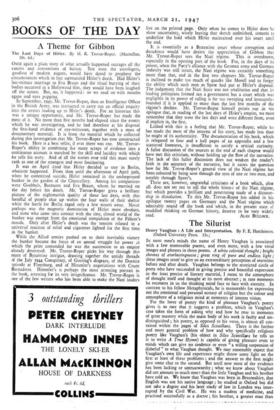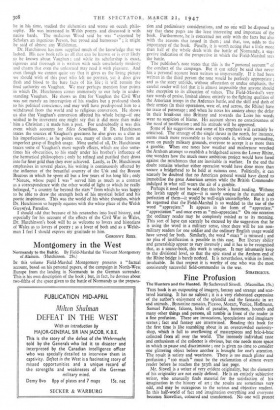The Silurist
Henry Vaughan : A Life and Interpretation. By F. E. Hutchinson. (Oxford University Press. 15s.)
IN most men's minds the name of Henry Vaughan is associated with a few memorable poems, and even more, with a few vivid images and phrases in those poems. A white celestial thought ; bright shootes of everlastingnesse ; great ring of pure and endless light ; these images seem to give us an extraordinary perception of eternities before and after death. Vaughan belongs to the restricted circle of poets who have succeeded in giving precise and beautiful expression to the least precise of literary material, I mean to the atmosphere of thought itself and thought at its most abstract ; at rare moments he recreates in us the thinking mind face to face with eternity. In contrast to his fellow Metaphysicals, he is memorable for expressing not the emotional and personal ecstasy of religion but the colour and atmosphere of a religious mind at moments of intense vision.
For the lover of poetry the kind of pleasure Vaughan's poetry gives is so rare that it suggests a problem, which in Vaughan's case takes the form of asking why and how he rose to moments of great mastery while the main body of his work is faulty and un- distinguished ; his poetry, as opposed to his verse, is almost all con- tained within the pages of Silex Scitudlans. There is the further and more general problem of how and why specifically religious poetry like Vaughan's (his object in Silex Scintillans he tells us is to write A True Hymn) is capable of giving pleasure even to minds which can give no credence or even " a willing suspension of disbelief " to what Vaughan thought. We may reasonably expect that Vaughan's own life and experience might throw some light on the first at least of these problems ; and the answer to the first might give some clue to the second. But until now most of the evidence has been lacking or untrustworthy ; what we knew about Vaughan did not amount to much more than the little Vaughan and his brother have told us. We know that Vaughan was born in Breconshire, that English was not his native language ; he studied at Oxford but did not take a degree and his later study of law in London was inter- rupted by the Civil War. He was a student of medicine, and practised successfully as a doctor ; his brother, a greater man than he in his time, studied the alchemists and wrote on occult philo- sophy. He was interested in Welsh poetry, and discussed it with native bards. The malicious Wood said he was " esteemed by Scholars an ingenious Person, but proud and humorous " ; it might be said of almost any Welshman. Dr. Hutchinson has now supplied much of the knowledge that we lacked. His new book tells us all that can be known or is ever likely to be known about Vaughan ; and while its scholarship is exact, rigorous and thorough it is written with such unscholarly modesty and charm that even the unlearned may read it with pleasure. And even though we cannot quite say that it gives us the living picture we .should wish of this poet who left no portrait, yet it does give flesh and blood to the bare facts of his life ; it will remain the final authority on Vaughan. We may perhaps mention four points in which Dr. Hutchinson comes immensely to our help in under- standing Vaughan. He shows us that for Vaughan the Civil War was not merely an interruption of his studies but a profound shock to his political conscience, and may well have predisposed him to a withdrawal from the world and to religious conversion. He shows us also that Vaughan's conversion affected his whole being—if one wished to be irreverent one might say that it did more than make
' him a Christian ; it made him a poet. For undoubtedly it was this event which accounts for Silex Santillans. If Dr. Hutchinson traces the sources of Vaughan's greatness he also gives us a clue to his imperfections ; as he points out, many of them came from an imperfect grasp of English usage. Most useful of all, Dr. Hutchinson traces some of Vaughan's most superb effects, which are also some- times his obscurities, to his study under his brother's influence of the hermetical philosophers ; only he refined and purified their dross into far finer gold than they ever achieved. Lastly, as Dr. Hutchinson emphasises in several places, his writing is continuously affected by the influence of the beautiful country of the Usk and the Brecon Beacons in which he spent all but a few years of his long life ; only "Nature, whose pupil I was " served him as much as a contrast as a correspondence with the other world of light to which he really belonged, " a country far beyond the stars " from which he was happy to be able to draw the strength both of his mystical belief and his poetic inspiration. This was the world of his white thoughts, which Dr. Hutchinson so happily equates with the white place of the Welsh Gwynfyd, Paradise.
I should add that because of his researches into local history, and especially for his account of the effects of the Civil War in Wales, Dr. Hutchinson's book will be as welcome to lovers and historians of Wales as to lovers of poetry ; as a lover of both and as a Welsh- man I feel I should express my gratitude to him.
GORONWY REES.



































 Previous page
Previous page